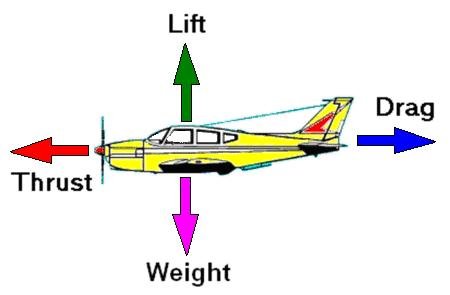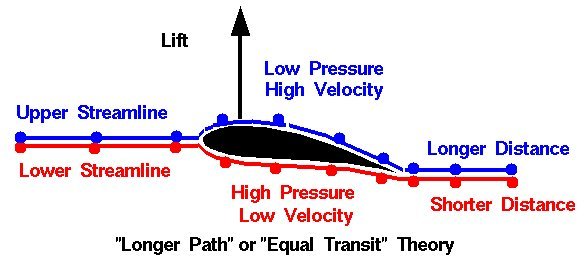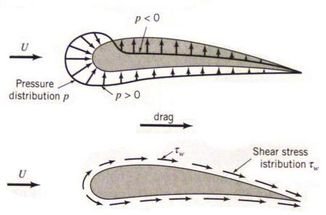Generation of Lift: Misconception and Truth
Hello Steemians, How are you? Hope All is well.
This post is in response to: Suesa's Science Challenge #2
In this post, I want to describe misconception about generation of lift. It is the basic theory of aerodynamics, yet it's misconception is wide among scholars, teachers and general people. It has already been 100 years after first flight of human. I have studied about theory too but still sometimes, I wonder how 10,000 kilogram of object flies in the sky. Let me explain the theory which may probably satisfy you.
The basic aerodynamic forces in the airplane while flying are:
- Weight, W, vertically acting down due to gravity.
- Thrust, T, due to engine towards direction of motion.
- Drag, F, due to friction and lift force towards opposite of direction of motion.
- lift, L, due to ...?(I'll explain this)
Now, I will explain popular theory about generation of lift called Equal Transit Time Theory. Let's take the cross section of wing of airplane and the streamlines as shown below.
The theory states that, the molecules in streamline above and below of the airfoil separated at the leading edge meet up at equal time in the trailing edge. The time is called transit time.
The measure of how fast you are travelling is given by velocity. It is the length object traveled in unit time. consider, one object traveled 5 meters in 2 seconds and other 4 meter in 1 second. To measure, how fast the object is travelling, we take into consideration both length and time. In the above situation, first object traveled more distance but took more time and second object traveled less distance but took less time. We can't compare apple with oranges. So, lets measure how much they travel in one second.
The first object traveled 5 meter in 2 seconds.
Then, it traveled (5/2) meter in 1 second.
So, velocity is 2.5 m/s.
The second object traveled 4 meter in 1 second.
Then, it traveled (4/1) meter in 1 second.
So, velocity is 4 m/s.
Hence,
Simply, velocity(v) = length(l)/ time(t)
The length traveled by molecules in upper streamlines is greater than length traveled by molecules in lower streamline. So, the velocity of the molecules in upper streamline is greater than velocity of molecules in lower streamline.
Now, to the Bernoulli's Equation:
Along the horizontal streamline;
P + 1/2 ρ v^2 = constant.
Here, ρ is constant called density of air. Density measure how much closely packed the molecules are. It is mass(m)/volume(v).
For easiness, let's consider ρ = 1.225 kg/m^3
Then,
P + 0.6125 v^2 = constant.
Also consider constant be 1(it is not necessarily so)
P + 0.6125 v^2 = 1
When, v = 0, P = 1
When, v = 1, P = 0.3875
clearly, when velocity is increased, pressure decreased.
So, the pressure at upper part of the airfoil is lower than the pressure at the lower part. Due to pressure difference lift is created.
Consequences:
- In the symmetric airfoil, the length to be traveled by streamline at upper and below of airfoil is same. So, since the transit time is equal, there won't be velocity difference and hence no pressure difference and finally, no force. But, it is known that even symmetric airfoils generate considerable amount of lift.
- Experimentally, it has been known that the molecule in the upper stream line and lower streamline don't meet up at the trailing edge in equal time. The velocity of molecule at the upper streamline is much faster.
The molecule in upper streamline has greater velocity than velocity of molecule in the lower streamline. This is true about the theorem but equal transit time is not true.
The Correct Theory
During the flow of gas through the object, there is different velocity of gas molecules at different points in the object. Due to Bernoulli's principle, there is variation of pressure too. This overall variation of pressure times the area gives the total force. The force perpendicular to the direction of motion is lift(L) and the component of force parallel to the motion is the drag(F).
In simple word, normal stress is pressure and stress along the motion is shear stress. the components of these two stresses give the lift and drag force.
dL = - P sinθ - τ cosθ
dF = - P cos θ + τ sin θ
P is normal stress, τ is shear stress and θ is angle of attack.
Integrating these expression, we can find expression for lift and drag.
I am annoyed about misconception in generation of lift as it is very basic and still many scholars, books, encyclopedia, professors follow equal transit time theory.
Sources




Wow I'm all cleared up about this concept now. Thank you for clearing my confusions!
I hope I can contact you if I require help with other educational topics. :)
welcome and thanks to you too.
Sure, we can be in contact with each other.
This blew me away, brilliant piece, keep up the good work....
Thank you so much!!
@originalworks
The @OriginalWorks bot has determined this post by @gauss01 to be original material and upvoted it!
To call @OriginalWorks, simply reply to any post with @originalworks or !originalworks in your message!
To nominate this post for the daily RESTEEM contest, upvote this comment! The user with the most upvotes on their @OriginalWorks comment will win!
For more information, Click Here!
Some nice science; I'd be interested in a discussion of why transit times for symmetrical objects are not equal and why velocities of air differ even for symmetrical objects - perhaps a discussion of the Continuity Equation would also help explain how we come to this particular analogue of Bernouilli's Equation?
Good job!
@cjrc97
Very good questions for the discussion.
i. The difference in velocity can be defined from continuity equation too. The streamline above is narrower and the streamline lower is wider. From the continuity principle;
div(ρ v) + dρ/dt = 0
Assuming in-compressible air; Av = constant.
When the streamline goes towards narrower region, velocity increases and towards wider, velocity decreases.
So, velocity increases at top and decreases at bottom.
ii. I guess, the lift produced by the symmetric airfoil is due to angle of attack. In zero angle of attack, the transit time will also be same.
iii. Regarding Bernoulli equation. we considered the flow before trailing edge as same stream line.
use bernoulli between top to before trailing edge and then bottom to before trailing edge which shows that the bernoulli can be taken up and bottom side.
Very good article! I studies it before but I only knew the basic principles. You explained the theories in detail! Keep going!
Thank you, I hope you understood well :D Cheers
Great efforts put into this my man. Thanks for reaching out! Keep up the great work.
Upvoted. Talk soon.
Thank you
Sure :D
Great detailed post. Thanks for sharing. Upvoted and following u. Regards Nainaz
welcome.
Following you too
Thanks :D
This post recieved an upvote and resteem from OPENBULL. If you would like to recieve upvotes & resteem from OPENBULL on all your posts, simply FOLLOW @openbull Please consider up-voting this comment as this project is supported only by your up-votes!
Thank you !!
Its great post, thank for you share..
Follow, vote and resteem my post @marzukie.,
I am a member of the circle of friends.
Zakie